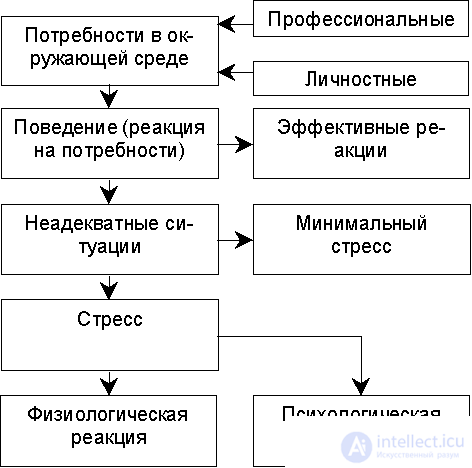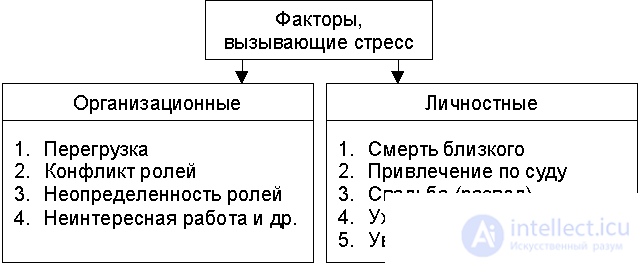Lecture
The nature of stress. Stress (from the English. Stress - stress) - a state of stress that occurs in a person under the influence of strong influences . Stress is a common and frequent occurrence (irritability or insomnia before a responsible event - an exam, a report, etc.). In any organization, even with a favorable psychological climate, there are situations that cause stress, for example, lack of time to complete the entire scope of work.
Nervousness, anxiety (stress), when the situation gets out of control. Minor stresses are inevitable and harmless. Excessive stress is what creates problems for individuals and organizations. Hence the need to distinguish between the permissible level of stress and excessive stress is costly for the employee and the organization: the effectiveness and well-being of the person decreases, and the diseases generated by stress shorten his life. This applies particularly to senior managers, whose responsibility is immeasurably higher than that of an ordinary employee. In this case, stress is characterized by excessive psychological or physiological stress (Fig. 6.19).

Fig. 6. 19. Model of stress response.
The physiological signs of stress include ulcers, hypertension, back pain, asthma and pain in the heart. Psychological manifestations include irritability, loss of appetite, and depression.
Causes of stress . The main cause of stress is change, innovation, the frequency of which in modern conditions has increased dramatically. Any change, even a positive one, for example, an increase in the status of an employee, upsets the balance of our environment, which we seek to maintain.
If the manager * feels the presence of frequent stress, he should strive to eliminate the factors that make stress excessive. At the same time, a clear presentation of the symptoms of stress is required (Fig. 6.20.).
|
Symptoms of stress |
|
1. Health problems. |
|
2. Sleep problems. |
|
3. Nervousness and tension. |
|
4. Chronic experience. |
|
5. Inability to rest. |
|
6. Excessive drinking or smoking. |
|
7. Feeling of not being able to cope. |
|
8. Emotional instability. |
|
9. Impression and easy vulnerability. |
Fig. 6. 19. Typical symptoms of stress.
As the manager solves his own problems with tension, he must simultaneously solve similar problems of his subordinates, minimizing risk factors for stress symptoms as much as possible. Therefore, managers should strive to eliminate sources of stress, both for themselves and for their employees.
There are two groups of factors that cause stress: organizational and personal (Fig. 6.21.)

Fig. 6.21. The main causes of stress.
Organizational factors . Employee overload is the first cause of stress in organizations. In this case, there is anxiety, a sense of hopelessness and material loss.
The second factor is the conflict of roles, when an employee is presented with conflicting requirements. Role conflict can occur, for example, as a result of violation of the principle of unity of command. As a result, there is a feeling of anxiety and tension.
The third factor is the uncertainty of the roles. In this case, the employee is not sure what is expected of him. In contrast to the conflict of roles, the requirements here are not very controversial, but they are evasive and uncertain.
The fourth factor is uninteresting work. Studies have shown that people who have a more interesting job, show less anxiety and less prone to physical ailments than those engaged in uninteresting work.
In addition, stress can occur as a result of poor working conditions (temperature, insufficient lighting, excessive noise), as well as information failure, the wrong relationship between authority and responsibility.
Personality factors . The potential causes of stress, which can lead to a decrease in performance, include many events that occur outside the organization, i.e. in the personal life of the employee. The greatest influence is the death of a spouse, divorce, illness, death of a close relative, etc.
Given the effect of stress on productivity, a manager must learn to manage stress himself and help reduce the stress level of his employees. This can be done using the following recommendations.
Based on the influence of a particular work on the results of the company, develop a system of priorities in its activities.
Learn to say "no" when you reach the limit in the amount of work that you have to do, or insist on assigning deadlines to complete the task given to you.
When putting forward conflicting requirements from your management (role conflict), explain the inconsistency and impossibility of their implementation.
Take time every day to disconnect and rest. During this period, get the work out of your mind, relax, turn to pleasant thoughts and images.
Achieve proper rewards for effective work.
Comments
To leave a comment
Management
Terms: Management